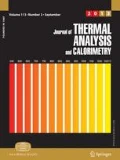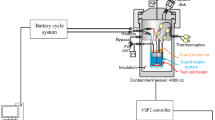Abstract
Overcharge is a common case of battery thermal abuse, which can accelerate the aging of battery and cause the attenuation of battery capacity. In extreme conditions, overcharge can generate a large amount of heat, leading to battery failure and thermal runaway. Therefore, it is necessary to take measures to improve the safety during the overcharge process. In this paper, phase change materials (PCMs) are used to mitigate the temperature of overcharged lithium-ion batteries (LIBs), which proves that PCMs can effectively reduce the battery surface temperature as well as the probability of thermal runaway. In order to identify the appropriate PCM on the thermal management of overcharged LIBs, PCMs with phase change temperatures (PCTs) of 37°C, 43°C, 58°C are used in the tests. The results show that the PCM-37 exhibits the best performance. In addition, different degrees of overcharge also bring different effects to the battery, while the applications of PCMs can well mitigate the sharp increase in temperature. The findings demonstrate the feasibility of PCMs on improving the thermal safety of overcharging LIBs and further provide guidance on the development of more efficient battery thermal management systems (BTMSs) where the overcharge usually occurs.










Similar content being viewed by others
References
Liu H, Wei Z, He W, Zhao J. Thermal issues about Li-ion batteries and recent progress in battery thermal management systems: a review. Energy Convers Manage. 2017;150:304–30.
Huang Y, Mei P, Lu Y, Huang R, Yu X, Chen Z. A novel approach for Lithium-ion battery thermal management with streamline shape mini channel cooling plates. Appl Therm Eng. 2019;157:113623.
Panchal S, Khasow R, Dincer I, Agelin-Chaab M, Fraser R. Thermal design and simulation of mini-channel cold plate for water cooled large sized prismatic lithium-ion battery. Appl Therm Eng. 2017;122:80–90.
Mao N, Wang Z, Chung YH, Shu CM. Overcharge cycling effect on the thermal behavior, structure, and material of lithium-ion batteries. Appl Therm Eng. 2018;163:114147.
Zeng G, Bai Z, Huang P, Wang Q. Thermal safety study of Li-ion batteries under limited overcharge abuse based on coupled electrochemical-thermal model. Int J Energy Res. 2020;44(5):3607–25.
Wang C, Zhu Y, Gao F, Qi C, Zhao P, Meng Q, Wang J, Wu Q. Thermal runaway behavior and features of LiFePO4/graphite aged batteries under overcharge. Int J Energy Res. 2020;44(7):5477–87.
Zhang Z, Du Z, Han Z, Wang H, Wang S. Temperature characteristics of lithium iron phosphate power batteries under overcharge. Int J Energy Res. 2020;44(14):11840–51.
Liu J, Duan Q, Ma M, Zhao C, Sun J, Wang Q. Aging mechanisms and thermal stability of aged commercial 18650 lithium ion battery induced by slight overcharging cycling. J Power Sources. 2020;445:227263.
Xu F, He H, Liu Y, Dun C, Ren Y, Liu Q, Wang M, Xie J. Failure investigation of LiFePO4 cells under overcharge conditions. J Electrochem Soc. 2012;159(5):A678–87.
Kong D, Wen R, Ping P, Peng R, Zhang J, Chen G. Study on degradation behavior of commercial 18650 LiAlNiCoO2 cells in over-charge conditions. Int J Energy Res. 2019;43(1):552–67.
Zeng Y, Wu K, Wang D, Wang Z, Chen L. Overcharge investigation of lithium-ion polymer batteries. J Power Sources. 2006;160(2):1302–7.
Sharma N, Peterson VK. Overcharging a lithium-ion battery: Effect on the LixC6 negative electrode determined by in situ neutron diffraction. J Power Sources. 2013;224:695–701.
Saito Y, Takano K, Negishi A. Thermal behaviors of lithium-ion cells during overcharge. J Power Sources. 2001;97:693–6.
Ouyang D, Weng J, Liu J, Chen M, Wang J. Influence of current rate on the degradation behavior of lithium-ion battery under overcharge condition. J Electrochem Soc. 2019;166(12):A2697–706.
Ohsaki T, Kishi T, Kuboki T, Takami N, Shimura N, Sato Y, Sekino M, Satoh A. Overcharge reaction of lithium-ion batteries. J Power Sources. 2005;146(1):97–100.
Ouyang M, Ren D, Lu L, Li J, Feng X, Han X, Liu G. Overcharge-induced capacity fading analysis for large format lithium-ion batteries with LiyNi1/3Co1/3Mn1/3O2+LiyMn2O4 composite cathode. J Power Sources. 2015;279:626–35.
Ouyang D, Chen M, Weng J, Wang J. A comparative study on the degradation behaviors of overcharged lithium-ion batteries under different ambient temperatures. Int J Energy Res. 2020;44(2):1078–88.
Huang P, Verma A, Robles DJ, Wang Q, Mukherjee P, Sun J. Probing the cooling effectiveness of phase change materials on lithium-ion battery thermal response under overcharge condition. Appl Therm Eng. 2018;132:521–30.
Zhang J, Li X, Zhang G, Guo J, Huang Q, Wang C, Zhou D, Wei D. Experimental investigation on the essential cause of the degrading performances for an overcharging ternary battery. Int J Energy Res. 2020;44(4):3134–47.
Lu W, Lopez CM, Liu N, Vaughey JT, Jansen A, Dees DW. Overcharge effect on morphology and structure of carbon electrodes for lithium-ion batteries. J Electrochem Soc. 2012;159(5):A566–70.
Zhang L, Ma Y, Cheng X, Cui Y, Guan T, Cao Y, Du C, Yin G, Lin F, Nordlund D. Degradation mechanism of over-charged LiCoO2/mesocarbon microbeads battery during shallow depth of discharge cycling. J Power Sources. 2016;329:255–61.
Jiang L, Luo Z, Wu T, Shao L, Sun J, Liu C, Li G, Cao K, Wang Q. Overcharge behavior and early warning analysis of LiNi0.5Co0.2Mn0.3O2/C lithium-ion battery with high capacity. J Electrochem Soc. 2019;166(6):A1055–62.
Ye J, Chen H, Wang Q, Huang P, Sun J, Lo SM. Thermal behavior and failure mechanism of lithium ion cells during overcharge under adiabatic conditions. Appl Energy. 2016;182:464–74.
Chang CM, Lin HF, Liao SC, Chiu HT, Liu CE, Guo HL. Effects of negative electrodes coated by ZnO with different morphologies on electrochemical performances and safety of lithium ion batteries. Int J Electrochem Sci. 2019;14(2):1197–207.
Wang Z, Liu L, Chen L, Huang X. Structural and electrochemical characterizations of surface-modified LiCoO2 cathode materials for Li-ion batteries. Solid State Ionics. 2002;148(3):335–42.
Aboulaih A, Ouzaouit K, Faqir H, Kaddami A, Benzakour I, Akalay I. Improving thermal and electrochemical performances of LiCoO2 cathode at high cut-off charge potentials by MF3 (M=Ce, Al) coating. Mater Res Bull. 2016;73:362–8.
Zhu C, Liu J, Yu X, Zhang Y, Jiang C, Dong P, Zhang Y. 4-Bromoanisole (4BA) as additive for overcharge protection of Lithium-ion batteries. Int J Electrochem Sci. 2019;14(5):4571–9.
Wang S, Liu J, Yu X, Liu J, JuRong, Zhu C, Wang Q, Yuan Z, Zhang Y. Electrochemical behavior of 3,4-ethylenedioxythiophene as an anti-overcharge additive for lithium-ion batteries. Int J Electrochem Sci. 2019; 14(10):9527–9536.
Wang Z, Jiang L, Liang C, Zhao C, Wei Z, Wang Q. Effects of 3-fluoroanisol as an electrolyte additive on enhancing the overcharge endurance and thermal stability of lithium-ion batteries. J Electrochem Soc. 2020;167(13):130517.
Belov D, Yang MH. Failure mechanism of Li-ion battery at overcharge conditions. J Solid State Electrochem. 2008;12:885–94.
Huang L, Zhang Z, Wang Z, Zhang L, Zhu X, Dorrell DD. Thermal runaway behavior during overcharge for large-format Lithium-ion batteries with different packaging patterns. J Energy Storage. 2019;25:100811.
Weng J, Ouyang D, Yang X, Chen M, Zhang G, Wang J. Alleviation of thermal runaway propagation in thermal management modules using aerogel felt coupled with flame-retarded phase change material. Energy Convers Manage. 2019;200:112071.
Wang Z, Wang J. Investigation of external heating-induced failure propagation behaviors in large-size cell modules with different phase change materials. Energy. 2020;204:117946.
Kshetrimayum KS, Yoon YG, Gye HR, Lee CJ. Preventing heat propagation and thermal runaway in electric vehicle battery modules using integrated PCM and micro-channel plate cooling system. Appl Therm Eng. 2019;159:113797.
Wilke S, Schweitzer B, Khateeb S, Al-Hallaj S. Preventing thermal runaway propagation in lithium ion battery packs using a phase change composite material: An experimental study. J Power Sources. 2017;340:51–9.
Li J, Zhang H. Thermal characteristics of power battery module with composite phase change material and external liquid cooling. Int J Heat Mass Transf. 2020;156:119820.
Jiang L, Zhang H, Li J, Xia P. Thermal performance of a cylindrical battery module impregnated with PCM composite based on thermoelectric cooling. Energy. 2019;188:116048.
Rao Z, Wang Q, Huang C. Investigation of the thermal performance of phase change material/mini-channel coupled battery thermal management system. Appl Energy. 2016;164:659–69.
Zhao R, Gu J, Liu J. Optimization of a phase change material based internal cooling system for cylindrical Li-ion battery pack and a hybrid cooling design. Energy. 2017;135:811–22.
Shi JN, Ger MD, Liu YM, Fan YC, Wen NT, Lin CK, Pu NW. Improving the thermal conductivity and shape-stabilization of phase change materials using nanographite additives. Carbon. 2013;51:365–72.
Elgafy A, Lafdi K. Effect of carbon nanofiber additives on thermal behavior of phase change materials. Carabon. 2005;43(15):3067–74.
Chen YJ, Nguyen DD, Shen MY, Yip MC, Tai NH. Thermal characterizations of the graphite nanosheets reinforced paraffin phase-change composites. Compos Part A-Appl Sci Manuf. 2013;44:40–6.
Li Z, Sun WG, Wang G, Wu ZG. Experimental and numerical study on the effective thermal conductivity of paraffin/expanded graphite composite. Sol Energy Mater Sol Cells. 2014;128:447–55.
Ji H, Sellan DP, Pettes MT, Kong XH, Ji J, Shi L, Ruoff RS. Enhanced thermal conductivity of phase change materials with ultrathin-graphite foams for thermal energy storage. Energy Environ Sci. 2014;7(3):1185–92.
Kumar P, Chaudhary D, Varshney P, Varshney U, Yahya SM, Rafat Y. Critical review on battery thermal management and role of nanomaterial in heat transfer enhancement for electrical vehicle application. J Energy Storage. 2020;32:102003.
Bamdezh MA, Molaeimanesh GR. Impact of system structure on the performance of a hybrid thermal management system for a Li-ion battery module. J Power Sources. 2020;457:227993.
Weng J, Yang X, Zhang G, Ouyang D, Chen M, Wang J. Optimization of the detailed factors in a phase-change-material module for battery thermal management. Int J Heat Mass Transf. 2019;138:126–34.
Ouyang D, Weng J, Chen M, Wang J. Impact of high-temperature environment on the optimal cycle rate of lithium-ion battery. J Energy Storage. 2020;28:101242.
Lai X, Zheng YJ, Zhou L, Gao W. Electrical behavior of overdischarge-induced internal short circuit in lithium-ion cells. Electrochim Acta. 2018;278:245–54.
Wang Q, Mao B, Stoliarov SI, Sun J. A review of lithium ion battery failure mechanisms and fire prevention strategies. Prog Energy Combust Sci. 2019;73:95–131.
Yan J, Li K, Chen H, Wang Q, Sun J. Experimental study on the application of phase change material in the dynamic cycling of battery pack system. Energy Convers Manage. 2016;128:12–9.
Ouyang D, He Y, Chen M, Liu J, Wang J. Experimental study on the thermal behaviors of lithium-ion batteries under discharge and overcharge conditions. J Therm Anal Calorim. 2018;132(1):65–75.
Zhu X, Wang Z, Wang C, Huang L. Overcharge investigation of large format lithium-ion pouch cells with Li (Ni0.6Co0.2Mn0.2) O2 cathode for electric vehicles: degradation and failure mechanisms. J Electrochem Soc. 2018;165(16):A3613–29.
Zhu X, Wang Z, Wang Y, Wang H, Wang C, Tong L, Yi M. Overcharge investigation of large format lithium-ion pouch cells with Li (Ni0.6Co0.2Mn0.2) O2 cathode for electric vehicles: thermal runaway features and safety management method. Energy. 2019;169:868–80.
Leising RA, Palazzo MJ, Takeuchi ES, Takeuchi KJ. Abuse testing of lithium-ion batteries-characterization of the overcharge reaction of LiCoO2/graphite cells. J Electrochem Soc. 2001;148(8):A838–44.
Liu Y, Huo R, Qin H, Li X, Wei D, Zeng T. Overcharge investigation of degradations and behaviors of large format lithium ion battery with Li (Ni0.6Co0.2Mn0.2) O2 cathode. J Energy Storage. 2020;31:101643.
Deng Y, Ma Z, Song X, Cai Z, Pang P, Wang Z, Zeng R, Shu D, Nan J. From the charge conditions and internal short-circuit strategy to analyze and improve the overcharge safety of LiCoO2/graphite batteries. Electrochim Acta. 2018;282:295–303.
Al-Hallaj S, Selman JR. A novel thermal management system for electric vehicle batteries using phase-change material. J Electrochem Soc. 2000;147(9):3231–6.
Weng J, He Y, Ouyang D, Yang X, Zhang G, Weng J. Thermal performance of PCM and branch-structured fins for cylindrical power battery in a high-temperature environment. Energy Convers Manage. 2019;200:112106.
Acknowledgements
This research was financially supported by National Natural Science Foundation of China (No. 51909152) and the Open Project of State Key Laboratory of Fire Science (No. HZ2021-KF07).
Author information
Authors and Affiliations
Corresponding author
Additional information
Publisher's Note
Springer Nature remains neutral with regard to jurisdictional claims in published maps and institutional affiliations.
Rights and permissions
About this article
Cite this article
Liu, J., Fan, Y. & Xie, Q. Temperature mitigation effect of phase change material on overcharging lithium-ion batteries: an experimental study. J Therm Anal Calorim 147, 5153–5163 (2022). https://doi.org/10.1007/s10973-021-10875-3
Received:
Accepted:
Published:
Issue Date:
DOI: https://doi.org/10.1007/s10973-021-10875-3




